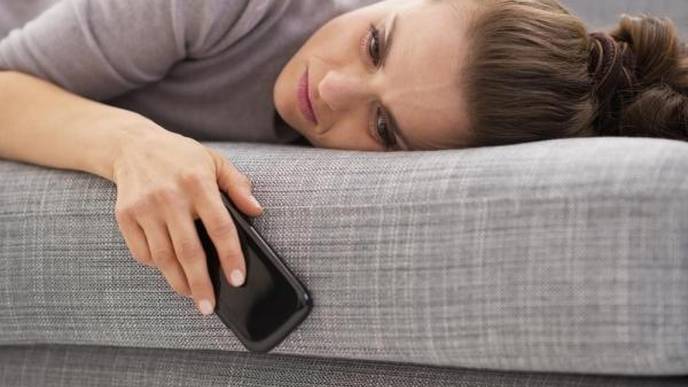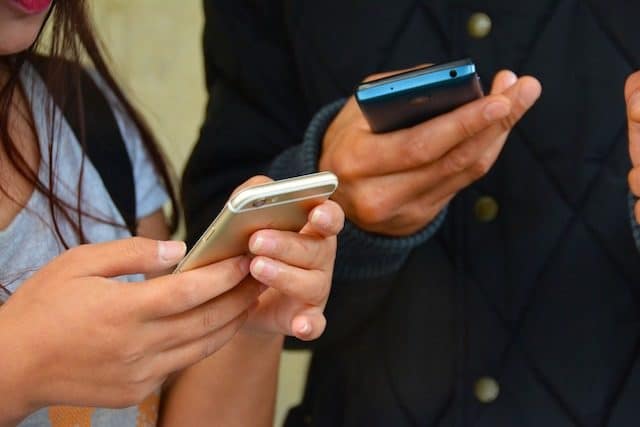SLOW WAY TO DIE! FUN TO USE BUT PHONES CAN KILL YOU- SEE 10 SCARY WAYS HANDSETS CAN SEND YOU TO YOUR GRAVE
If you ask anyone these days to name one thing they can’t live without, their cell phone would probably top the list. If you’re anything like me, the sheer act of reaching around a giant purse without immediately grabbing a hold of your precious smartphone is the easiest way to go straight into panic mode. That’s because, thanks to good ol’ technology, most of us have become completely addicted to our phones, relying on them for everything from ordering take-out to staying in touch.

But besides making us majorly needy, smartphone separation anxiety can actually have a slew of other negative side effects, according to health experts.
Eye strain


Between our TVs and computers, many of us spend hours upon hours every day staring at screens. Throw a smartphone into the mix and it won’t be long before your eyes have simply had too much. In fact, I’ll be the first to admit that I’ve tired out my own eyes plenty of times just scrolling through my Instagram feed. “Extended use of digital devices and exposure to screens can cause digital eye strain,” Dr. Howard Purcell, an optometrist, Fellow of the American Academy of Optometry, and the Senior Vice President of Customer Development at at Essilor, told me. “Symptoms can include blurry vision, trouble focusing on one thing, red, tired, or dry eyes, as well as headaches.”

This is because our devices emit low levels of harmful blue light, which Dr. Purcell says that studies suggest can change the way our pupils react to light, causing light sensitivity and strain around and behind the eyes. “Think of the eyes like any muscle. You have six muscles that move each eye, and one muscle that focuses it,” he said. “Overuse can certainly cause your eye to fatigue.”

If you’re going to be concentrating on any screen for a long time, Dr. Purcell suggests trying the 20/20/20 rule. “The goal is to take a break every 20 minutes, for 20 seconds, and look at something that’s at least 20 feet away.”
Neck pain


Whether we’re catching up with friends via group text or laughing along to an adorable cat video on YouTube, using our cell phones usually results in us being hunched over, which can wreak havoc on our neck and shoulders.

“Using your phone too much results in what doctors call ‘overuse injuries’,” Dr. Jennifer Stagg, naturopathic physician and author of Unzip Your Genes, told me. One of the main problems she sees in her practice, she says, is neck strain. “From leaning forward or holding your head in awkward positions for extended periods of time,” she said. Cell phone-related neck strain is so common, doctors have even given it it’s own name—text neck. “Research shows that for every inch you drop your head forward, you double the load on those muscles,” said Dr. Robert Bolash in an article for Cleveland Clinic, where he is a pain specialist. “Looking down at your smartphone, with your chin to your chest, can put about 60 pounds of force on your neck.”
Lower oxygen levels


Besides neck and shoulder pain, slouching over to look at your phone can cause other health concerns, including lowered oxygen to your brain. According to Cleveland Clinic, sitting in a slumped position hinders your lungs’ ability to expand, thus impairing your lung capacity. Inhaling less oxygen means your heart needs to work harder to send more oxygen-carrying blood throughout your body, including to your brain. And let’s just say that lower oxygen levels aren’t exactly a walk in the park, especially over time.
Wrist sprains


If texting is your favorite means of communication, you might want to err on the side of caution the next time your phone dings with a new notification. Dr. Stagg told me that carpal tunnel and wrist sprains in her patients are often a result of cell phone overuse. “From holding the phone for extended periods of time, compressing the carpal tunnel and also causing inflammation of the tendon attachments,” she said.
Texting thumb


If a sprained wrist isn’t enough to put your phone on “Do Not Disturb” mode, Kimberly Hershenson, LMSW, a New York-based therapist whose practice includes treating individuals with social media and technology addiction, told me that “text thumb” is another common injury seen in patients who spend too much time on their phones. “Pain, discomfort, or numbness in the thumb can occur from overuse due to constant texting and typing,” she told me.
Impaired sleep
Ever decide to check Facebook before bed only to find yourself still scrolling your feed at 2 a.m.? While staying up past your bed time is probably okay every once in a blue moon, habitually using your cell phone before bed can have several adverse affects.
Ever decide to check Facebook before bed only to find yourself still scrolling your feed at 2 a.m.? While staying up past your bed time is probably okay every once in a blue moon, habitually using your cell phone before bed can have several adverse affects.

“Constantly looking at your phone not only keeps your brain up but actually affects and suppresses your melatonin levels,” Erica Hornthal, founder of Chicago Dance Therapy and licensed dance therapist, told me. Hershenson agreed, saying, “The glare from the phone light, as well as engaging on your phone, keeps the brain active not allowing you to wind down and calm the body for bed.”
Anxiety


In addition to negatively affecting our bodies, constantly looking at our phones can impact our mental health, too. “I coined a term called ‘acquired anxiety disorder’ because of the massive amounts of people I treat in recent years who have major anxiety issues,” Kersting said. “This is from spending so much time in the cyber world and not enough time in the real world.”

As we constantly pump our minds with scary news and content from the self-glorified worlds of our peers, Kersting said, the more insecure we become. “Remember, we are doing this for nine hours per day on average, 365 days a year. Our minds need silence, not a constant bombardment.”
Depression


In addition to making us anxious and paranoid, constantly checking our phones—especially when that involves a lot of time on social media—can end up making us feel sad and excluded. “What we don’t realize that we are doing is attempting to fill our self-esteem with likes and affirmations—constantly,” Kersting explained. “Yet, the first word in ‘self-esteem’ is ‘self’, not ‘others’.” Hershenson also thinks that phone addiction can have a negative impact on self-esteem. “It allows us is to hide behind screens and present the lives we want others to think we have,” she told me. “We often see pictures about vacations, fun activities, and photoshopped bodies.”

She explained that this leads to comparisons, making it easy to start thinking, Why are they so happy when I’m struggling? “The truth is, we don’t know what is truly going on with people’s lives.”
Hallucinations


If you’ve ever sworn you felt your cell phone vibrate in your back pocket only to check it and find zero missed calls and no new notifications, don’t worry, you aren’t crazy. You may, however, be totally addicted to your phone. “Recent studies with college students found that smartphones are making the majority of them hallucinate,” Kersting told me. “It is called ‘phantom vibration syndrome’.”

According to one study, the majority of students surveyed have experienced a “phantom vibration” of buzzing in their pockets, even when their cell phone wasn’t vibrating. If you’re feeling phantom vibrations on the regular, you may want to give your cell phone a little space.
Acquired ADHD


Being addicted to our cell phones is causing us all to become majorly distracted, too. “Since the average person spends nine hours per day, seven days per week staring into highly stimulating devices, their brains get messed up,” Kersting explained.
“Countless teenagers, for example, are now being diagnosed with ADHD, even though most of them don’t even have the neurological condition. Instead, because their brains are so used to being stimulated, the brain loses its ability to concentrate, focus ,and be organized when it needs to be in certain situations.”
Make time to disconnect


If you’ve recently found yourself a little too dependent on your smartphone, it may be a sign that it’s time to create some distance. “We have to train ourselves to be in control of our phone instead of it being in control of us,” Kersting said. To do this, he suggests leaving your phone in the car when you go to dinner, work, or the mall. “It will be very uncomfortable at first as you will feel that you are missing a part of yourself, but eventually you’ll get used to it. “Forget about what everyone else is doing today, this is superficial nonsense. Detox from social media for a month and you will see what I mean.”
If totally disconnecting from technology sounds like too big of a challenge, Hershenson suggests turning off all notifications so you aren’t getting alerts when new items are posted, and instead, schedule times when you check technology. She also says it’s important to recognize your triggers for turning to technology.
“Is it when you’re lonely or bored? If you are struggling with depression, stress, or anxiety, technology may be a way to self-soothe moods.” Instead, she suggests finding healthier ways of managing your moods, such as practicing relaxation techniques like deep breathing or meditation. You can also find alternative ways of connecting to others such as going out with friends (without taking selfies) instead of texting and hanging out on social media.
via dailyadvent
Labels: Facts

0 Comments:
Post a Comment
Subscribe to Post Comments [Atom]
<< Home